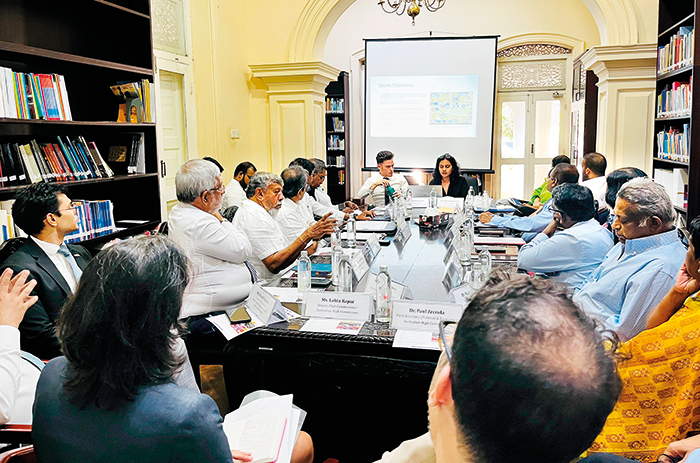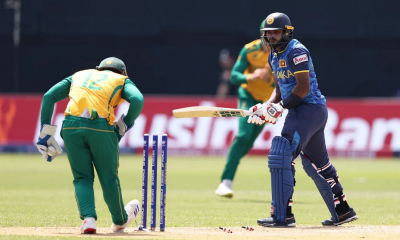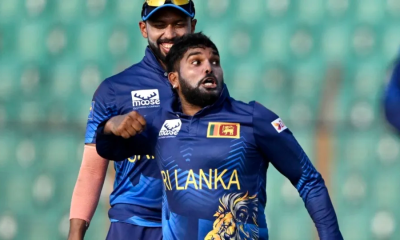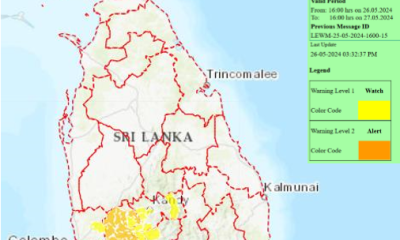News
Australia’s importance as an influential Middle Power emphasized at LKI Roundtable Consultation

The Lakshman Kadirgamar Institute of International Relations and Strategic Studies (LKI) hosted a roundtable discussion on 1 February 2024 on the theme “Strengthening Engagement in Sri Lanka – Australia Relations’ ‘. LKI’s Roundtable series provides a platform for experts on the respective subject to engage in a candid discussion and support research output that informs policymakers and other relevant parties.
Opening the ‘round table’ held under Chatham House Rules, Ambassador Ravinatha Aryasinha emphasised that Australia was an important and influential Middle Power with whom Sri Lanka has had a longstanding relationship. He emphasised the need for Sri Lanka foreign policy to engage more with such relationships, even as it remains pre-occupied with the complexities emanating from the major power rivalries in the region.
Building on presentations by the LKI Research team, comprising Ms. Ishara Tilakaratna, an undergraduate student at the University of Melbourne, Australia, who concluded a four-month internship, and Michael Iveson, Research Fellow (Global Economy), the discussion was contributed to by former Sri Lankan High Commissioners to Australia, and representatives of the Ministry of Foreign Affairs, the Australian High Commission in Colombo, Sri Lanka’s Export Development Board, Board of Investment, Port City Colombo, the Sri Lanka-Australia-New Zealand Business Council of the Ceylon Chamber of Commerce, academic, defence, sports and civil society experts.
In the discussion on the politico-strategic dimension between Australia and Sri Lanka, attention was drawn to the longstanding political relationship and the mutual support on pressing issues. Experts highlighted proactive and candid two-way communication as key to effective cooperation with Australia. Notable cooperation included Sri Lanka’s assistance to Australia in curbing human smuggling and Australia’s nuanced approach to Sri Lanka’s separatist conflict and in its aftermath.
Ongoing political engagement continues to support Sri Lanka’s maritime and cyber security, with collaborative projects like the coastal forecast system funded by Australia. Sri Lanka’s role as Chair of the Indian Ocean Rim Association offers opportunities for increased engagement, particularly in hydrography and oceanography. Stakeholders also praised Australian efforts to promote good governance and build public sector capacity in Sri Lanka through knowledge transfer and local empowerment. Experts emphasised the importance of sharing best practices in governance for structural reforms and illegal asset recovery.
The socio-cultural dimension of the relationship between Australia and Sri Lanka focussed mainly on engaging the Sri Lankan diaspora in Australia. It was noted that concerns among the diaspora include delays in dual nationality processing and transparency in financial contributions. It was noted that following the establishment of the Office of Overseas Sri Lankan Secretariat (OOSLA) in the Presidential Secretariat, concerted action was underway to address these concerns and to more proactively engage with the diaspora across the globe.
While Australia’s support to Sri Lanka Cricket was lauded, disappointment was expressed over not taking advantage of similar support for other sports, despite signing a Memorandum of Understanding on sports cooperation in late 2023. In the field of education, it was noted that while nearly 30 Australian affiliated institutes operated in Sri Lanka, granting University status to some who qualify to conduct full degree programmes would be more cost effective for Sri Lankans and also help Sri Lanka establish itself as an educational hub in the region.
The economic dimension of the Australia-Sri Lanka relationship focussed on trade, investment, tourism, and development assistance. Sri Lanka’s exports were modest to Australia, as Sri Lanka’s export basket is matched by that of China, Indonesia and Vietnam who export to Australia with a geographical and cost advantage under free trade agreements and other institutional arrangements.
Noting the historical importance of Australian investment in Sri Lanka during the 1990s, it was observed that an Australian-branded university will commence operations shortly in the Port City Colombo, which is an international multi-services Special Economic Zone (SEZ). Australia was also highlighted as a successful source of tourism to Sri Lanka, but questions were raised whether the potential of this sector has been fully exploited, given the influence the large Sri Lankan diaspora could have in encouraging Australians to travel to Sri Lanka.
News
US sports envoys to Lanka to champion youth development

The U.S. Embassy in Colombo welcomed the U.S. Sports Envoys to Sri Lanka, former National Basketball Association (NBA) and Women’s National Basketball Association (WNBA) players Stephen Howard and Astou Ndiaye, from June 8 through 14.
The Public Diplomacy section of the U.S. Embassy said that it would launch a weeklong basketball program intended to harness the unifying power of sports, made possible through collaboration with Foundation of Goodness and IImpact Hoop Lab.
While in Sri Lanka, Howard and Ndiaye, both retired professional basketball players, will conduct a weeklong program, Hoops for Hope: Bridging Borders through Basketball. The Sports Envoys will lead basketball clinics and exhibition matches and engage in leadership sessions in Colombo and Southern Province for youth aged 14-18 from Northern, Uva, Eastern and Western Provinces, offering skills and leadership training both on and off the court. The U.S. Envoys will also share their expertise with the Sri Lanka Basketball Federation, national coaches, and players, furthering the development of basketball in the country. Beyond the clinics, they will collaborate with Sri Lankan schoolchildren to take part in a community service project in the Colombo area.
“We are so proud to welcome Stephen and Astou as our Sports Envoys to Sri Lanka, to build on the strong people-to-people connections between the United States and Sri Lanka,” said U.S. Ambassador Julie Chung. “The lessons that will be shared by our Sports Envoys – communication, teamwork, resilience, inclusion, and conflict resolution – are essential for leadership development, community building, equality, and peace. The U.S. Sports Envoy program is a testament to our belief that sports can be a powerful tool in promoting peace and unity.”
News
Rahuman questions sudden cancellation of leave of CEB employees

SJB Colombo District MP Mujibur Rahuman in parliament demanded to know from the government the reasons for CEB suspending the leave of all its employees until further notice from Thursday.
MP Rahuman said that the CEB has got an acting General Manager anew and the latter yesterday morning issued a circular suspending leave of all CEB employees with immediate effect until further notice.
“We demand that Minister Kanchana Wijesekera should explain this to the House. This circular was issued while this debate on the new Electricity Amendment Bill was pending. There are many who oppose this Bill. The Minister must tell parliament the reason for the urge to cancel the leave of CEB employees,” the MP said.However, Speaker Mahinda Yapa Abeywardena prevented Minister Wijesekera responding to the query and said that the matter raised by MP Rahuman was not relevant.
News
CIPM successfully concludes 8th Annual Symposium

The Chartered Institute of Personnel Management (CIPM) successfully concluded the 8th Annual CIPM Symposium, which took place on 31st May 2024. Themed “Nurturing the Human Element—Redefining HRM in a Rapidly Changing World,” the symposium underscored the pivotal role of human resource management (HRM) in today’s dynamic global landscape. Since its inception in 1959, CIPM has been dedicated to advancing the HR profession through education, professional development, and advocacy, solidifying its position as Sri Lanka’s leading professional body for HRM.
Ken Vijayakumar, the President of the CIPM, graced the occasion as the chief guest. The symposium commenced with the welcome address by the Chairperson, Prof. Arosha Adikaram, followed by the Web Launch of the Symposium Proceedings and Abstract Book by the CIPM President. The event featured distinguished addresses, including a speech by Chief Guest Ken Vijayakumar, President of CIPM, and an address by Guest of Honor Shakthi Ranatunga, Chief Operating Officer of MAS Holdings Pvt. Ltd., Sri Lanka.
The symposium also featured an inspiring keynote address by Prof. Mario Fernando, Professor of Management and Director of the Centre for Cross Cultural Management (CCCM) at the University of Wollongong, Australia.
Vote of Thanks of the inauguration session was delivered by Dr. Dillanjani Weeratunga, Symposium Co-chair.
The symposium served as a comprehensive platform for researchers to present their findings across a wide range of critical topics in HRM. These included Cultural Diversity and Inclusion, Talent Development and Retention, Ethical Leadership and Corporate Social Responsibility, Adapting to Technological Advancements, Mental Health and Well-being at Work, Global Workforce Challenges, Employee Empowerment, and Reskilling and Upskilling.
The plenary session was led by Prof. Wasantha Rajapakse. Certificates were awarded to the best paper presenters during the valedictory session, followed by a vote of thanks delivered by Kamani Perera, Manager of Research and Development.
The annual symposium of CIPM was a truly inclusive event, attracting a diverse audience that spanned undergraduates, graduates, working professionals, research scholars and lecturers. This widespread interest highlights the symposium’s significance in the field of HRM, offering a unique opportunity for everyone to network and learn from scholarly brains.The CIPM International Research Symposium was sponsored by Hambantota International Port, Sri Lanka Institute of Information Technology (SLIIT), E B Creasy & Co. PLC, and Print Xcel Company.
























